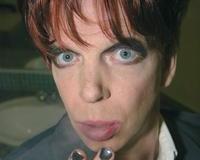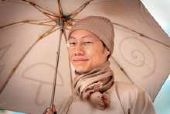It’s alarmingly intimate, and surprisingly peaceful. Seeing Francesca’s face for the first time – and I feel like I can call her Francesca – was a gentle introduction. Handing me the mirror felt like an act of trust. Now I have all the power, the power to look, and Francesca is naked. I can stare at the strange tattoo on her shoulder, I can watch the curve of her neck and her neat, dark hair. I can wonder if she’s smiling, or if that’s just how her mouth moves when she swallows. If I want, I could move the mirror around her body and explore it, six inches by six inches, in the oval that the mirror allows.
But I don’t. I hold the mirror very still, and look at Francesca’s eyes. Not in them, but at them. I am holding the mirror so that its top edge runs through Francesca’s pupils, and I’m looking at the shadows under her eyes in the hope that this will fool her into thinking I’m maintaining eye contact. In truth, I’m too scared to look at Francesca and I wish to God that she would stop looking at me.
When Francesca Steele gave me the mirror she wasn’t giving me any power at all. This is her room, her performance, and she has her fingers on my throat. When someone feels your pulse it feels like they have access to your heart. Now my heart is starting to panic – and she can feel it. Up until this moment I had been following instructions (‘Walk towards Francesca,’ the man outside had told me, ‘and sit on the chair’), but now, left to my own resources I realise I have none to draw on. The normal distancing strategies that separate one stranger from another have been removed – the comfort blanket of language, the anonymity of numbers, the intellectual and physical distance of standing in a crowd. I haven’t looked at anyone for this long that I’m not in love with.
The boundaries between us – my boundaries – have been broken, but who broke them? I decided to come here, but Francesca is in control. Sitting in the corner, holding this expensive mirror, I have been manipulated by Francesca so that all I can do is look at her. And by looking at her I’m enabling her to look at me. She is watching me, in other words, and there’s nothing I can do about it. Selfishly, perhaps, this is the most terrifying – and the most thrilling – part of the performance. Looking at Francesca’s reflection, I am of course looking at mine. In fact, I can see part of my head in the mirror: an eye, an eyebrow, a string of unruly hair. I can’t even look myself in the eye anymore. I break eye contact, with both of us, and it’s time to go.
Pulse is a gentle, intimate performance – performed by you the visitor as much as by Francesca Steele. Of course, each visitor’s experience will be profoundly different, and mine was informed by the discomfort I feel at meeting strangers. Stripping social interaction bare, Pulse forces the visitor to examine his or her own methods of communication, but its force is slow and gentle. Francesca’s physical vulnerability at the start of the performance is a generous gift – she relinquishes some power to the visitor. But nudity can also be intimidating, and it gives the act of looking an electric charge that is as inhibiting as it is intimate.
The most significant element of Pulse, however, is not its physical transgression, but its temporal one. Ten minutes is a long time to look at someone – anyone – and especially someone that you don’t know. Ten minutes is in fact a long time just to be with someone that you don’t know. It’s this temporal feature, taking time out of a busy schedule, concentrating on one thing for a prolonged period of time, that feels the most intrusive and also the most productive. It’s an intense, personal intimacy that breaks the cardinal rules of modern living: emotional distance and the ability to multi-task. Pulse breaks all the rules, in fact, that separate us from one another and let us believe in our autonomy. As beautiful as the experience was, it was a relief to leave.
Mary Paterson




No comments:
Post a Comment